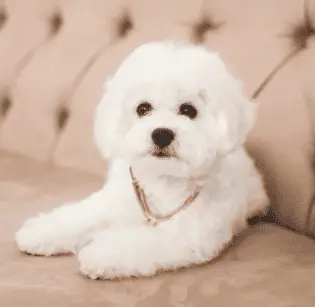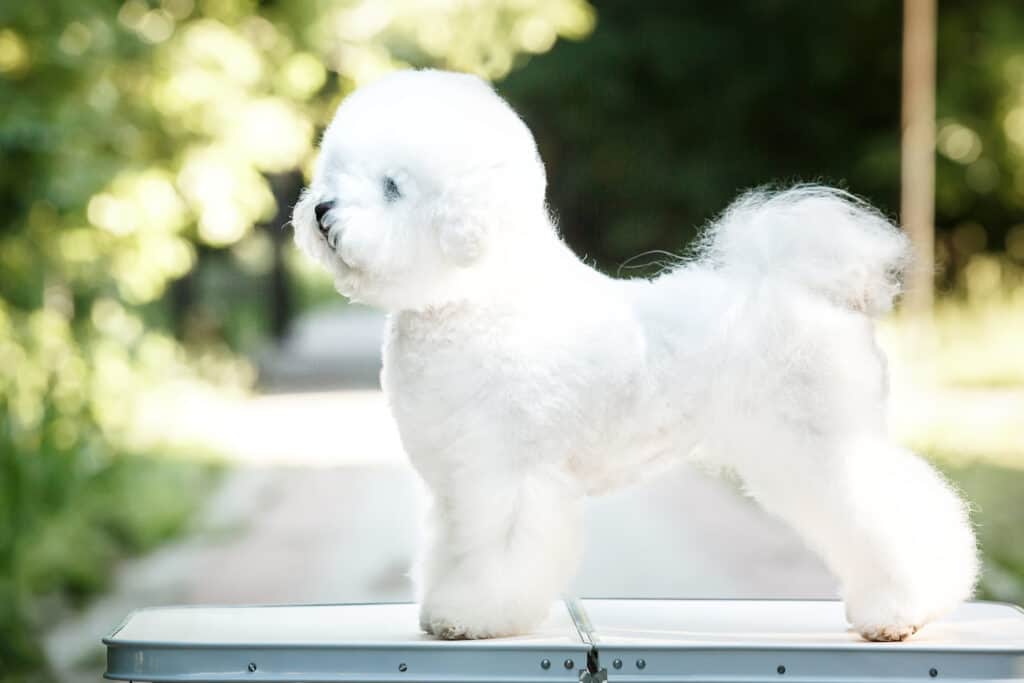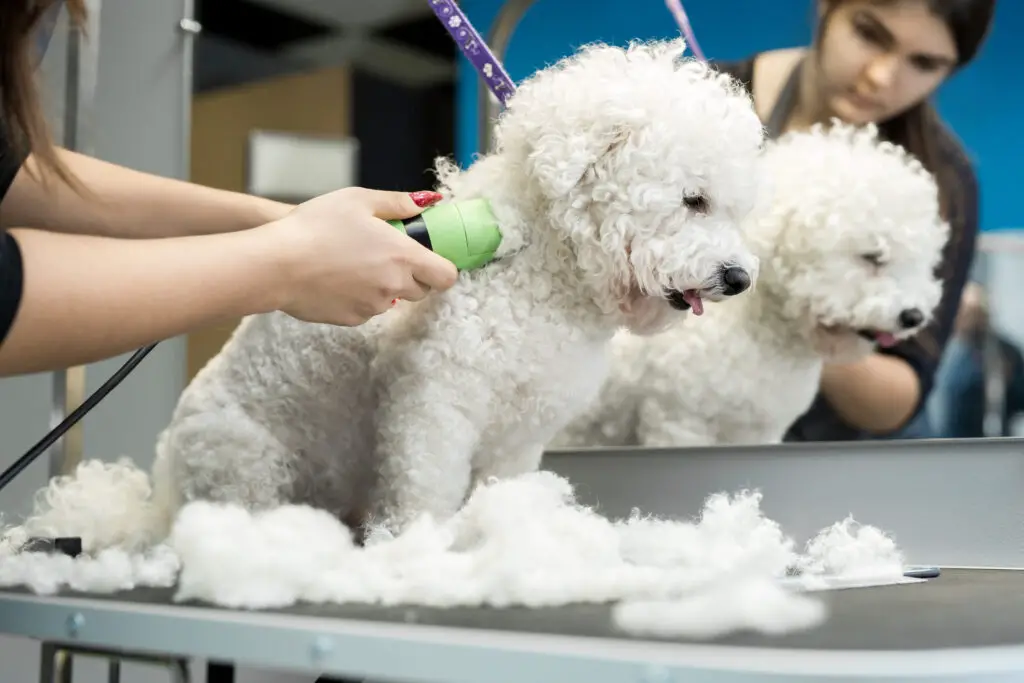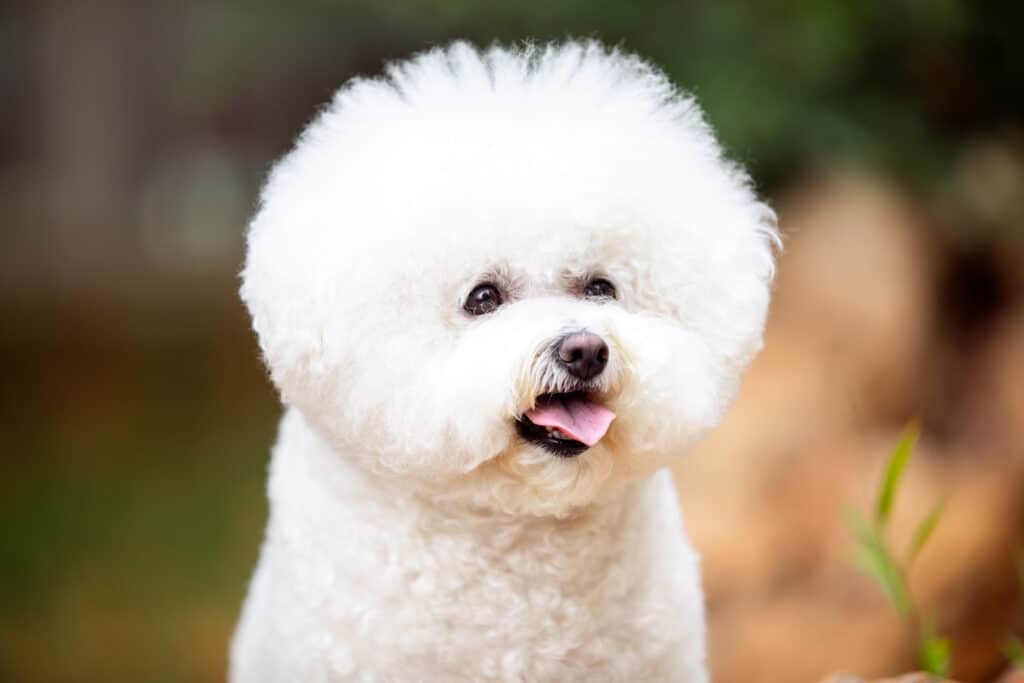Our website is supported by our users. We sometimes earn money when you click an affiliate link and make a purchase. This is at no extra cost to you and helps us to create quality content. Thank you for your support. For all that have shown us such wonderful support, we thank you from the bottom of our hearts!
Bichon Frises, often referred to simply as “bichons,” are small purebred dogs with a long history and a charming personality.
Originating from the Mediterranean area, they eventually made their way to the Canary Islands due to their popularity in maritime trade history.
Specifically, Bichon Frises have a strong connection to the island of Tenerife, where they were named “bichon à poil frisé” (curly haired lap dog) due to their distinctive fluffy, curly coat.

You may know Bichon Frises for their friendly temperament and attractive appearance.
According to the American Kennel Club (AKC) Standard, Bichons are described as “a white powder puff of a dog whose merry temperament is evidenced by his plumed tail carried jauntily over the back and his dark-eyed inquisitive expression.”
These characteristics have helped Bichons maintain their ongoing popularity as lovable companions.
In addition to their charm and good looks, Bichon Frises have a history as beloved royal pets, especially in France during the reign of King Henry III.
Throughout their existence, Bichon Frises have remained highly adaptable, serving as both companion animals for sailors and entertainers in circuses.
As you can see, the history of Bichon Frise is filled with delightful twists and turns, leaving no doubt about the enduring appeal of this small yet captivating breed.
History of the Bichon Frise
The Bichon Frise is a small dog breed with a long and fascinating history that originates from the Mediterranean region.
As you learn more about your Bichon Frise, you will be intrigued by their historical role in society and their journey across countries like Italy, Spain, France, and the Canary Islands.
While the exact origin story of the Bichon Frise isn’t definitively known, it’s believed to have descended from the Barbet, a curly-haired water spaniel. As their lineage evolved, the breed was introduced to Tenerife in the Canary Islands by Spanish sailors.
During the 13th century, Bichons began making their way into the royal courts of Spain, Italy, and France. Their endearing temperament and charming appearance made them esteemed companions of European nobility.

Here are some key periods in Bichon Frise history:
- 13th century: Association with European nobility begins in Spain, Italy, and France.
- 16th century: French royalty, including King Francis I and King Henry III, embraced the breed, further elevating its status.
- Late 19th century: Popularity faded among nobility, but Bichons found a new role as circus performers and companions to street entertainers.
- 20th century: Bichon Frise was recognized as a distinct breed, and the Société Centrale Canine began maintaining breed records.
In modern times, the Bichon Frise continues to bring joy to people as a loving and affectionate family pet.
The breed was officially recognized by the American Kennel Club in the 1970s, solidifying its place in today’s dog world.
As you discover the rich history of your Bichon Frise, it’s evident that their charming nature, intelligence, and adaptability have stood the test of time.
Embrace your Bichon’s historical background and cherish the moments you share with your treasured companion.

Physical Characteristics of the Bichon Frise
The Bichon Frise is a small but sturdy dog, known for its distinctive curly coat and cheerful disposition.
As a popular small breed, the Bichon Frise has specific physical characteristics that make it unique and easy to identify. In this section, we will discuss its size, coat, and other traits that define this charming breed.
Height Male
Males typically reach a height of 9.5 to 11.5 inches when measured at the shoulder. This compact size makes them an ideal choice for those looking for a small but sturdy companion.
Height Female
Females are generally slightly smaller than their male counterparts. They usually stand at a height of 9 to 11 inches at the shoulder.
Weight Male
Males typically weigh between 12 and 18 pounds. This small size contributes to their versatility as companions, as they are easy to carry and transport if needed.
Weight Female
Females tend to weigh slightly less than males, usually falling within 10 to 16 pounds. This smaller stature is typical of the breed, reflecting their compact and sturdy nature.
Eye Colors
These dogs have large, dark eyes that contribute to their expressive and friendly facial appearance. The AKC standard indicates that their eyes should be round and dark, creating a pleasing contrast against their white coat.
Coat Colors
The most common coat color for Bichons is pure white. However, they can also have shades of apricot, buff, cream, or gray mixed with the white, making for a visually appealing combination.
Coat Types
One of the most notable characteristics of the Bichon Frise is its curly coat. This double-layered coat has a silky, curly outer layer and a soft undercoat that gives it a distinctive “powder-puff” appearance. The curls help to create a hypoallergenic coat, making Bichons an excellent choice for those with allergies.
Life Expectancy
Bichons Frises generally have a life expectancy of 14 to 15 years. This long lifespan is a testament to their overall health as a breed.
With proper care, you can expect many years of happy companionship with your Bichon Frise.
In summary, the Bichon Frise is a small dog breed with a unique curly coat and charming features.
Whether you prefer their compact size, hypoallergenic coat, or cheerful personality, you will undoubtedly appreciate the many physical characteristics that make this breed truly distinctive.
Temperament & Training of the Bichon Frise
The Bichon Frise is known for its cheerful attitude and affectionate temperament. These little dogs are sociable, making them excellent companions for families and individuals alike.
They have a playful nature and are quite intelligent, which translates well into their training.
However, they also have a bit of an independent streak, so early socialization and training are essential to help them develop confidence and good behavior.
Bichons are naturally agile, and their exercise needs can be met with regular play sessions and walks.
Their happy and energetic behavior is contagious and can be an excellent way to bond with your furry friend.
However, it is essential to keep in mind that Bichons can be prone to separation anxiety when left alone for extended periods, so be sure to provide them with a supportive and loving environment to minimize their stress.
Training a Bichon Frise can be relatively easy due to their intelligence and eager-to-please attitude.
Start with basic obedience training, such as sit, stay, and come, gradually introducing more advanced commands.
Be consistent and patient, offering plenty of praise and positive reinforcement.
Housebreaking Bichons can be slightly more challenging as they can be stubborn at times.
To overcome this, establish a regular schedule for potty breaks and stick to it.
Reward your Bichon for successful trips outside, and be patient as they learn the ropes. Consistency is key here, as well as understanding that it may take a little longer for them to grasp the concept.
In summary, the temperament of a Bichon Frise is cheerful, affectionate, and playful.
They are intelligent, making them relatively easy to train, but their independent streak and potential for separation anxiety require early socialization and consistent training techniques.
By understanding and catering to these needs, you’ll have a well-rounded and happy companion in your Bichon Frise.
Health Issues of the Bichon Frise
Allergies
Bichon Frises are known for their beautiful, hypoallergenic coats, but ironically, they are not immune to allergies themselves.
Allergic reactions in Bichon Frises may be caused by environmental factors such as pollen, dust mites, mold, or dietary allergens.
You can minimize your Bichon’s exposure to potential allergens by maintaining a clean living environment and providing a high-quality diet.
That said, sometimes there is no avoiding it when they are allergic to grass or dust.
Cataracts
Juvenile cataracts are a common health issue among Bichon Frises. This eye condition could lead to cloudiness or opacity in the lens, affecting your dog’s vision.
To keep your Bichon Frise’s eyes healthy, schedule regular check-ups with a veterinary ophthalmologist.
Early detection and treatment can help prevent severe vision loss.
Bladder Stones
Bladder stones are a common health concern for Bichon Frises. These can cause discomfort and urinary tract infections (UTIs) in your dog.
To help prevent bladder stones, ensure your Bichon Frise has access to fresh water and a well-balanced diet. Regular veterinary check-ups will also help detect bladder stones early on.
Heart Disease
Heart disease can be a potential problem for Bichon Frises, particularly as they age. Good dental health and weight management will lower the risk of developing heart issues.
It is essential to schedule yearly heart checks with a veterinary professional to monitor your dog’s cardiac health.
While these health issues can be concerning, a proactive approach to your Bichon Frise’s well-being can help you effectively manage them.
Regular veterinarian visits, a balanced diet, and maintaining a clean environment are crucial steps you can take to keep your furry friend happy and healthy.
Patellar Luxation
Patellar luxation, a common orthopedic issue, can affect Bichon Frises. In this condition, the kneecap (patella) moves out of its normal position, leading to discomfort and altered gait.
Bichons may exhibit lameness or skip on the affected limb. The severity of patellar luxation varies, and it often requires veterinary evaluation.
In mild cases, management may involve weight control and joint supplements, while more severe instances might necessitate surgical correction.
Regular veterinary check-ups are vital to monitor and address patellar luxation in Bichon Frises, ensuring their mobility and overall well-being.
Grooming Your Bichon Frise
Brushing
Regular brushing is essential for maintaining your Bichon Frise’s beautiful, hypoallergenic coat. Aim to brush your dog’s fur at least 2 to 3 times a week, using a slicker brush followed by a comb to remove any dead hair and prevent tangles.
For show dogs, daily brushing is recommended to maintain that powder-puff appearance.
Begin by brushing from the bottom layers and work your way up to the top while gently holding the hair to avoid tugging on the skin.
Bathing
Bathing your Bichon Frise is crucial to maintain its striking white coat. Bathe your dog at least once a month, or more frequently if needed.
Always use a dog-specific shampoo and conditioner, as human products can be too harsh on your dog’s skin and hair. Wet your dog’s fur to the skin before carefully applying the shampoo, avoiding the eyes and ears.
Massage the shampoo into the coat and rinse thoroughly.
Rinse thoroughly, and ensure to dry your dog with a towel, followed by a low heat hairdryer to fluff up their coat.

Cutting Fur/Hair
Trimming your Bichon Frise’s hair helps prevent matting, tangling, and maintains their overall appearance.
It is recommended to have your dog professionally groomed every 4 to 5 weeks, but you can trim in between appointments if you feel comfortable.
Focus on essential areas such as the eyes, ears, and sanitary regions. Using electric clippers, ensure to use a calm and steady hand, always cutting in the direction of hair growth.
Clipping or Grinding Nails
Regular nail trimming is important for your Bichon Frise’s overall health and comfort. You can choose between using traditional nail clippers or a rotary nail grinder, depending on your preference.
Aim to trim your dog’s nails every 4 weeks, taking care not to cut the quick (the pink part inside the nail), which can bleed and cause pain.
If you accidentally cut the quick, apply styptic powder to stop bleeding.
Also, you can check out our articles on How to Grind Your Dog’s Nails and How to Clip Your Dog’s Nails.
Dental Care
Keeping your Bichon Frise’s teeth clean is crucial for preventing dental issues and bad breath.
Brush your dog’s teeth at least 2 to 3 times a week using a dog-specific toothpaste and toothbrush.
These teeth wipes can make it easier to get around your dog’s little mouth to get where the brush cannot.
Encourage your dog to chew on dental toys and consider dental treats to help maintain good oral hygiene.
Cleaning Ears
Clean your Bichon Frise’s ears weekly to prevent infections, as their fluffy coat can trap dirt and moisture.
Use a dog-specific ear cleaner and damp cotton balls to clean the outer ear gently, being cautious not to insert anything deep into their ear canal.
Another great option are these Pet MD Ear Cleaning wipes.
Monitoring and maintaining your dog’s ears can help prevent ear infections and costly vet visits.
By following these grooming tips, you can ensure your Bichon Frise stays clean, healthy, and looking their best.
Owning a Bichon Frise
Cost of Purchase
Purchasing a Bichon Frise puppy from a reputable breeder can range from $800 to $2000.
The price depends on factors such as pedigree, breeder reputation, and location. Be cautious of bichon puppy scams when purchasing online and always research the breeder thoroughly.
In addition, you might want to consult national club officers or board committees to ensure you’re dealing with ethical breeders.
Maintenance Costs
This little dog is known for its low exercise needs which can save you money on dog walking or daycare services.
However, they do have a tendency to develop allergies, which might increase veterinary expenses.
Additionally, their charming curly coat requires regular grooming, so consider professional grooming costs or investing in grooming tools for DIY maintenance.
Adopting a Bichon Frise
Adopting a Bichon Frise can be a rewarding experience, both emotionally and financially, when compared to purchasing one from a breeder.
Adoption fees may range from $100 to $400 and often include vaccinations and spay/neuter surgery.
Check out local clubs or rescue organizations to find a Bichon Frise in need of a loving home.

Finding Reputable Breeders
When searching for a reputable Bichon Frise breeder, consider the following steps:
- Consult the Breeder Directory Signup provided by the Bichon Frise Club of America (BFCA) for registered breeders.
- Verify that the breeder follows the Membership Code of Ethics set by BFCA.
- Look for involvement in dog conformation events, such as national specialties or best of breed winners, as these can indicate a commitment to breed standards.
- Enquire about BFCA mentor requirements or if the breeder has undergone judges’ education, signaling their commitment and knowledge about Bichon Frises.
Owning a Bichon Frise can be a delightful experience.
Whether you’re purchasing or adopting, remember to research and consult reliable sources to ensure a healthy, happy, and ethically-sourced pet.
Frequently Asked Questions

What is the typical lifespan of a Bichon Frise?
Bichon Frises usually have a lifespan of 12 to 13 years, which is similar to other dogs of their size. However, their life expectancy can vary depending on factors such as genetics, diet, and overall health.
To ensure a long and healthy life for your Bichon Frise, provide them with proper care, regular checkups, and a balanced diet.
What are the standard dimensions such as height and weight for a Bichon Frise?
A Bichon Frise typically stands at 9.5 to 11.5 inches tall at the shoulder and weighs between 12 to 18 pounds.
Males are slightly larger than females.
It is important to monitor your Bichon Frise’s weight and provide them with a balanced diet to prevent obesity, which can lead to health issues.
Can you describe the personality traits of a Bichon Frise?
Bichon Frises are a gentle dog breed and are known for their cheerful, playful, and sociable nature.
They love being around people and make great companions for families, singles, or seniors. Their affectionate disposition and the fact that they are low sensitivity dogs, makes them excellent therapy dogs as well.
Bichon Frises are intelligent and eager to please, which makes them reasonably easy to train. However, they can also be stubborn at times, so consistent and positive reinforcement training methods are recommended.
What are the different color variations found in Bichon Frises?
Bichon Frises have a soft, curly coat that is predominantly white.
They may have cream, apricot, or light tan markings, referred to as “buff” coloring. The American Kennel Club (AKC) breed standard calls for a coat that is at least 90% white.
Keep in mind that a Bichon Frise’s coat requires regular grooming to prevent matting and maintain a clean, fluffy appearance.
How much exercise does a Bichon Frise typically require?
Though small, Bichon Frises still require regular exercise to maintain their health and well-being.
A daily walk of 30 minutes to an hour is ideal, along with some playtime or mental stimulation.
Bichon Frises enjoy playing fetch, learning tricks, and participating in dog sports like agility.
Regular exercise, both physical and mental, helps to prevent boredom and the development of problem behaviors.
What factors contribute to the high cost of Bichon Frises?
The cost of Bichon Frises can vary depending on factors such as the breeder’s reputation, the dog’s pedigree, and their location.
Bichon Frises are a popular breed, and the demand may drive up their price.
Another contributing factor is the cost of caring for the breeding dogs and ensuring they are healthy, as responsible breeders will invest in regular health testing, proper diets, and other care.
Additionally, Bichon Frises require professional grooming, which can add to their ongoing expenses.
Conclusion: Bottom Line on the Bichon Frise

The Bichon Frise is a small, affectionate companion dog known for its playful and lively disposition. With its curly-haired lapdog appearance, these pups are the perfect choice for many families.
When you welcome a Bichon Frise into your home, you’re inviting a charming and intelligent companion to join you on your daily adventures.
These dogs excel in environments where they receive plenty of attention and mental stimulation. Their loving nature and sociability contribute to their reputation as great personality dogs.
With a little time and patience, your Bichon Frise will quickly learn new tricks and become a delightful addition to your family.
Being small and versatile, Bichons can adapt well to various living situations—from apartments to suburban homes with yards.
However, keep in mind that these dogs may suffer from allergies, so be cautious of the factors that trigger them, such as fleas, pollen, and certain shampoos.
To summarize, the Bichon Frise brings these qualities to your life:
- Affectionate: Loving and devoted companion
- Charming: Captivating appearance and personality
- Intelligent: Quick learner with strong problem-solving skills
So, if you’re looking for a small, loving, and intelligent furry friend, the Bichon Frise might just be the perfect match for you.
Just be prepared to dedicate time to their grooming and mental stimulation needs, and in return, you’ll have a delightful, lovable companion to share your life with.
Please read our Legal Disclaimer






